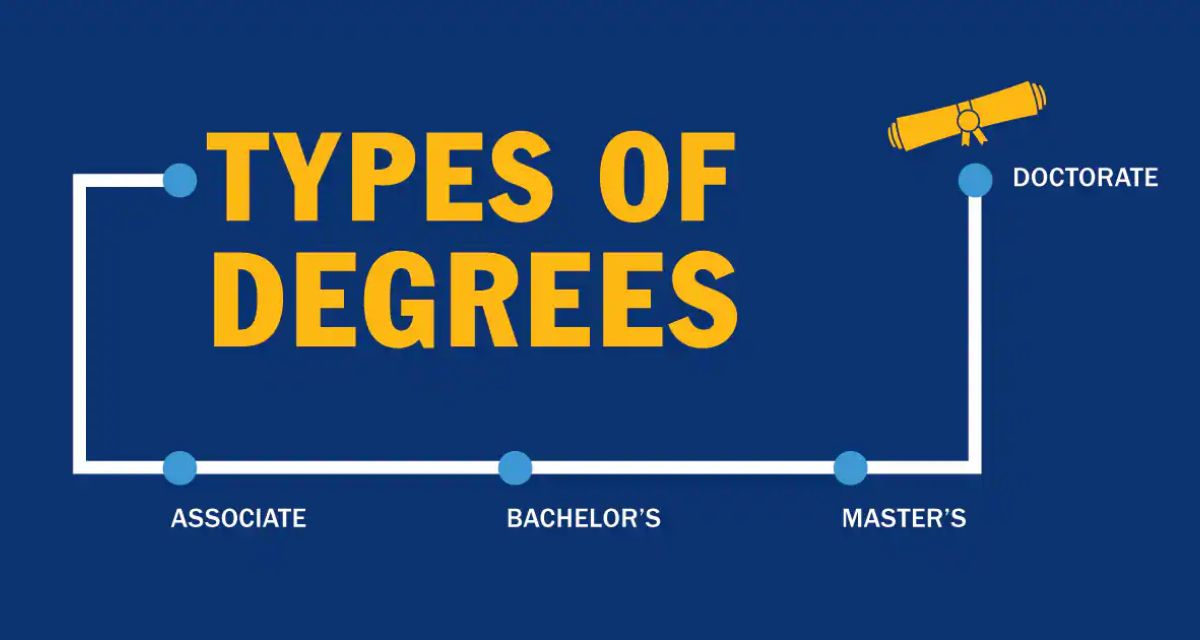Embarking on higher education involves navigating a diverse landscape of degree options. Understanding the various types of college degrees is crucial for students as they embark on their educational journey. Here’s a comprehensive guide to the different types of college degrees and their characteristics:
1. Associate Degree:
- Overview: A two-year degree typically offered by community colleges or vocational schools.
- Focus: Provides foundational knowledge in a specific field or serves as a stepping stone to a bachelor’s degree.
- Examples: Associate of Arts (AA), Associate of Science (AS), or Associate of Applied Science (AAS).
2. Bachelor’s Degree:
- Overview: A four-year undergraduate degree offered by colleges and universities.
- Focus: Provides in-depth knowledge in a chosen major and a broader education in general studies.
- Examples: Bachelor of Arts (BA), Bachelor of Science (BS), Bachelor of Fine Arts (BFA).
3. Master’s Degree:
- Overview: A graduate-level degree typically requiring one to two years of study beyond a bachelor’s degree.
- Focus: Offers specialized knowledge in a specific field and often includes research or a thesis.
- Examples: Master of Arts (MA), Master of Science (MS), Master of Business Administration (MBA).
4. Doctoral Degree (Ph.D.):
- Overview: The highest level of academic degree, requiring several years of study beyond a master’s degree.
- Focus: Emphasizes original research, a dissertation, and the advancement of knowledge in a specific field.
- Examples: Doctor of Philosophy (Ph.D.), Doctor of Education (Ed.D.), Doctor of Science (Sc.D.).
5. Professional Degrees:
- Overview: Specialized degrees designed for specific professions, often at the graduate level.
- Focus: Combines academic study with practical training and internships.
- Examples: Doctor of Medicine (M.D.), Juris Doctor (J.D.), Doctor of Pharmacy (Pharm.D.).
6. Certificates and Diplomas:
- Overview: Short-term programs that provide specialized skills or knowledge in a specific area.
- Focus: Designed for practical, hands-on training in a specific profession or skill set.
- Examples: Post-Baccalaureate Certificate, Vocational Certificate, Graduate Certificate.
7. Honorary Degrees:
- Overview: Degrees awarded to individuals for exceptional contributions to society or a particular field.
- Focus: Recognition of outstanding achievements, but recipients typically do not complete traditional coursework.
- Examples: Doctor of Humane Letters (DHL), Doctor of Science (Sc.D.) honoris causa.
8. Online Degrees:
- Overview: Degrees earned through online programs, offering flexibility for remote learning.
- Focus: Similar to traditional degrees but delivered through virtual platforms.
- Examples: Online Bachelor’s Degree, Online Master’s Degree, Online Certificate Programs.
9. Dual Degrees:
- Overview: Programs allowing students to earn two degrees simultaneously, often saving time and coursework.
- Focus: Enables interdisciplinary study and specialization in two distinct fields.
- Examples: Dual Bachelor’s Degrees, Dual Master’s Degrees.
10. Microcredentials: – Overview: Short, focused courses designed to develop specific skills or competencies. – Focus: Targets a particular skill set or knowledge area, often used for professional development. – Examples: Digital Badges, Nanodegree Programs, Short-term Workshops.
Understanding the different types of college degrees empowers students to make informed choices based on their career goals, interests, and preferred level of academic commitment. Whether pursuing a traditional path or exploring innovative options, each degree type offers unique opportunities for personal and professional growth.
